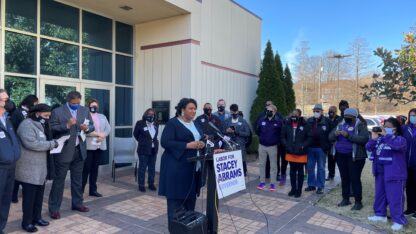Georgia Senate Creates Hybrid Religious Exemptions Bill
Two high profile bills meant to expand religious freedom in Georgia have been combined in the state legislature: the legally-redundant “Pastor Protection Act” meant to reassure clergy they won’t be required to marry same-sex couples, and the First Amendment Defense Act (FADA) which allows religious organizations to deny services to same-sex couples.
Sen. Greg Kirk, R-Americus, the sponsor of the FADA, proposed in the Senate Rules Committee Tuesday a new version of the “Pastor Protection Act” that includes slightly revised language from his bill.
Rep. Kevin Tanner, R-Dawsonville, the sponsor of the “Pastor Protection Act,” was also at the meeting, and did not say whether he approved of the changes, but he left before discussion was completed to attend votes in the House on different issues.
The “Pastor Protection Act” with the support of the powerful Speaker David Ralston, R-Blue Ridge, passed the House 161-0, but many in the business and LGBT communities have more concerns about FADA.
“I’ve listened to the concerns from the faith community, the business community and the LGBT community and I truly believe this legislation represents all individuals and protects the First Amendment rights of both the state and the nation we hold dear,” said Kirk.
According to the Associated Press, the Georgia Chamber of Commerce and the Metro Atlanta Chamber of Commerce said in a joint statement that they “helped to improve the bill,” along with senators.
But the statement said: “There are still unresolved issues that must be addressed in this bill in addition to the underlying concerns that remain about the potential adverse ramifications for Georgia’s economy, however these changes help move the bill in the right direction.”
Combining bills is fairly common in the Georgia legislature, but it can create complications.
For instance, while LGBT advocates were mostly quiet regarding the “Pastor Protection Act,” the FADA bill is farther reaching in the exemptions it would provide, and multiple LGBT advocates voiced concerns about potential discrimination Tuesday.
The hybrid bill could come up for a vote in the Senate as soon as this week.
If it passes that chamber, it would still need approval in House.
9(MDAxODM0MDY4MDEyMTY4NDA3MzI3YjkzMw004))








